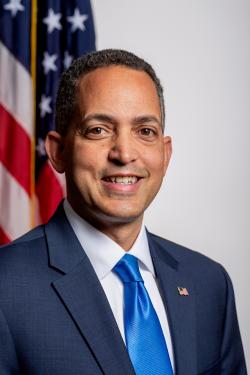U.S. Deputy Secretary of Commerce Don Graves outlined steps to strengthen economic engagement between the United States and African nations during a press briefing Wednesday in Johannesburg.
Graves is leading an American delegation at the African Growth and Opportunity Act (AGOA) Forum ministerial meetings. He said bolstering bilateral commercial relationships is a top priority for the Biden administration.
“Fostering new economic engagement with African countries is a top priority for the Biden-Harris administration. Shared, inclusive, and sustainable economic growth has been at the forefront of the President’s goals at the U.S.-Africa Leaders’ Summit in December and everything since. And since that summit, the administration has helped close 75 new commercial trade deals between the United States and African countries, for a total estimated value of $5.7 billion in two-way trade and investment. “
Adding that Since the U.S.-Africa Leaders’ Summit in December, the administration has helped facilitate $5.7 billion in new two-way trade and investment deals. Earlier this year, the Commerce Department also launched an Africa strategy focused on areas like digital transformation, climate initiatives, supporting diaspora-owned firms, and improving the business climate.
“Fostering new economic engagement with African countries is a top priority for the Biden-Harris administration,” Graves told reporters. “Shared, inclusive, and sustainable economic growth has been at the forefront of the President’s goals.”
Graves said realising equitable and inclusive development is the core aim behind U.S. efforts. He stressed that American trade policies should benefit workers and support regional integration.
“But most of all, we believe that our commitment to working with our partners and allies in Africa will lead to future prosperity for us all. By recognizing and working toward our shared commercial priorities, from improving clean energy to advancing the digital economy, from creative industries to critical minerals, and promoting economic growth, we’ll ensure a global economy that works for everyone.”
The deputy secretary called the economic partnership with Africa “a once-in-a-generation opportunity” for prosperity if shared priorities are recognised. He cited goals around clean energy, digital economy, critical minerals, and overall growth.
During the AGOA Forum, Graves has engaged African stakeholders in expanding commercial services, trade missions, and business relationships. He said working with allies on the continent would lead to future success.
The U.S. delegation is advocating increased economic ties as part of a whole-of-government approach under the Biden administration. Private sector partners are seen as indispensable to addressing pressing global challenges.
Graves revealed that, in 2020, the top five products imported by the U.S. private sector from Africa were vehicles, machinery, chemicals, fruits, and nuts, as well as wine. Conversely, U.S. private sector exports to Africa mainly consisted of machinery, aircraft, vehicles, cereals, and plastics.
The focus going forward is on sectors that align with the priorities outlined at the U.S.-Africa Leaders Summit, including sustainability, clean tech, the digital economy, cybersecurity, and the creative industries.
To foster stronger business relationships and people-to-people ties, the Commerce Department, through its Minority Business Development Agency, said it has launched a personal care and cosmetics trade promotion programme. This initiative will connect small- and medium-sized diaspora companies with counterparts throughout Africa.
Recognising the significance of small and medium enterprises (SMEs), the U.S. government aims to link these enterprises with African partners to stimulate economic growth.
Graves shared a success story he encountered during his visit, illustrating the potential for economic innovation. He met a South African entrepreneur who, despite having no prior experience in farming, learned to cultivate asparagus through online resources, particularly YouTube. This self-starting entrepreneur turned her newfound knowledge into a business, demonstrating the power of knowledge and opportunity.
He revealed that he visited U.S. company Equinix, which is investing $160 million in a data centre infrastructure project in South Africa, creating jobs in both South Africa and the United States. This venture is vital to building a robust digital ecosystem that will serve South Africa, the broader African continent, and international markets.
The Deputy Secretary also expressed confidence in the renewal of AGOA, emphasising the bipartisan support it receives in Congress. He believes that AGOA has untapped potential, which will be fully realised, and highlighted the African Continental Free Trade Area’s role in expanding opportunities for American companies.
During the Q&A session, the Deputy Secretary addressed concerns about AGOA and its significance in the face of challenges, such as reauthorization delays. He stressed his belief in AGOA’s substantial potential and the bipartisan support it enjoys in Congress, asserting that it is mutually beneficial for Africa and the United States.
“Lastly, when asked about AGOA’s role in counteracting China’s influence in Africa, Graves emphasized that the focus is on enhancing partnerships and supporting African economic growth, with American businesses being preferred partners. The U.S. government aims to provide technical assistance, reduce entry barriers, and build a level playing field for businesses, both American and African, to thrive.”
At the end, Deputy Secretary Graves underlined the enormous potential for economic growth in Africa, emphasising the continent’s status as the world’s fastest-growing and youngest region.
He encouraged strong U.S.-Africa partnerships, leveraging cultural ties and shared values while emphasising the importance of connecting the American diaspora with Africa.
Reiterating again that the U.S. government is committed to facilitating private sector collaboration and utilising its resources to bolster economic development in the region.


